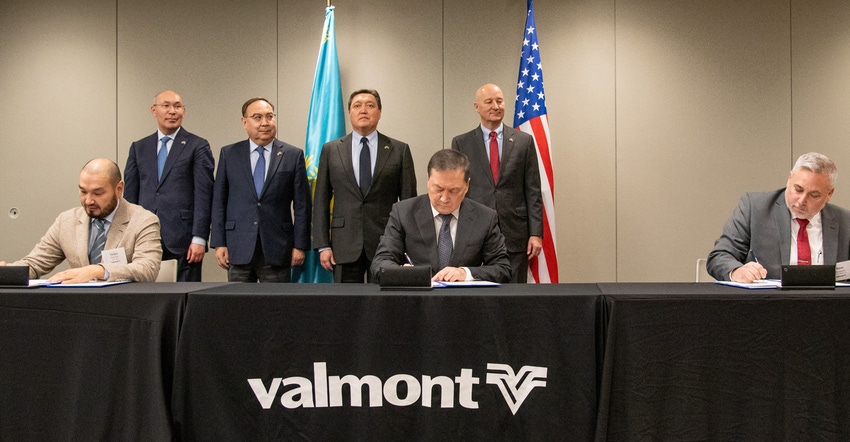December 18, 2019

Valley Irrigation, a Valmont company, recently announced it has signed an agreement with the Republic of Kazakhstan and private holding company Kusto Group to collaborate on a project that aims to ensure efficient use of water resources, share technologies with local farmers and maximize yields for Kazakhstan's agricultural sector.
The agreement outlines a road map toward the construction of a plant in Kazakhstan for the manufacture of Valley pivots, with an annual production capacity of 1,000 linear and pivot irrigation machines. The parties involved expressed interest in implementing some aspects of the project in the Astana International Financial Centre in Nur-Sultan, the capital of Kazakhstan.
Kazakhstan is the ninth-largest country in the world by land mass — the world's largest landlocked country — with a population of 18 million. An independent nation since 1991, Kazakhstan possesses large oil and mineral resources and seeks to tap into its huge agricultural potential.
Agriculture is among the priority sectors for Kazakhstan, where 75% of its territory is suitable for the industry and 15% of the population is employed in the field.
"Kazakhstan has tremendous potential to be an agricultural leader in Central Asia," said Josh Dixon, vice president and general manager of international irrigation for Valley. "The government of Kazakhstan is looking to Valley to help them institute best practices for farming that are sustainable and that produce higher and better yields while using fewer resources."
It is estimated that Valley technologies will increase crop productivity and reduce agricultural costs in Kazakhstan by 50%.
While in Omaha, Neb., Kazakhstan Prime Minister Askar Mamin met with Nebraska Gov. Pete Ricketts, Valmont Industries CEO Stephen Kaniewski, and Yerkin Tatishev, Kusto Group chairman of the board, to discuss matters of mutual interest, including agriculture and trade. They were joined by first lady Susanne Shore and Erzhan Kazykhanov, Kazakhstan's ambassador to the U.S.
"Kazakhstan occupies a strategic location at the crossroads of Europe and Asia, and 75% of its territory is suitable for agriculture," Ricketts said. "Given Nebraska's agricultural expertise, we have a clear opportunity to develop a mutually beneficial relationship with Kazakhstan. Congratulations to Valmont Industries on this partnership. The agreement with Kazakhstan showcases Nebraska's leadership in ag technology and the importance of building Nebraska's brand around the world."
Mamin also toured the facilities of Valmont Industries and saw the production capacities and technological processes of Valley firsthand.
"We are excited to welcome Valmont to Kazakhstan and work together with the global leader in mechanized irrigation," Mamin said. "The use of advanced technologies by Valley will have a 'multiplier effect' on crop production, yield enhancement and the creation of a sustainable forage base for livestock. Together, we will make Kazakhstan an agricultural leader."
The prime minister noted that Kazakhstan plans to increase the area of irrigated land from 1.4 million hectares to 2 million hectares by 2022, and to 3 million hectares (7.4 million acres) by 2030.
"The agreement signed today creates a world-class platform that will enable Kazakhstan to unlock its enormous agricultural potential," Tatishev said. "Valley brings more than 70 years of experience and know-how that will help our farmers and growers create sustainable incomes, build new jobs and fulfill the goal of helping Kazakhstan become a global food provider to the world."
The agreement will create a network of farms designed to demonstrate advanced irrigation technologies and train local farmers in responsible water management. Valley solutions, manufactured in Kazakhstan, will serve the domestic market and act as a hub for exports to the region.
The first step in this new partnership began in August with the opening of a Valley training facility and demonstration farm at the Barayev Scientific and Industrial Centre for Grain Farming. Located about 40 miles from the Kazakhstan capital, the Barayev institute is strategically situated in one of the country's oldest agricultural centers.
"It is a tremendous honor to help lead the development of sustainable agriculture in Kazakhstan," Dixon said. "In tandem with the Kazakh government and our partner Kusto Group, we will transform the country and the region."
Sources: Nebraska Governor's Office and Valmont Industries, which are solely responsible for the information provided and is wholly owned by the source. Informa Business Media and all its subsidiaries are not responsible for any of the content contained in this information asset
You May Also Like




